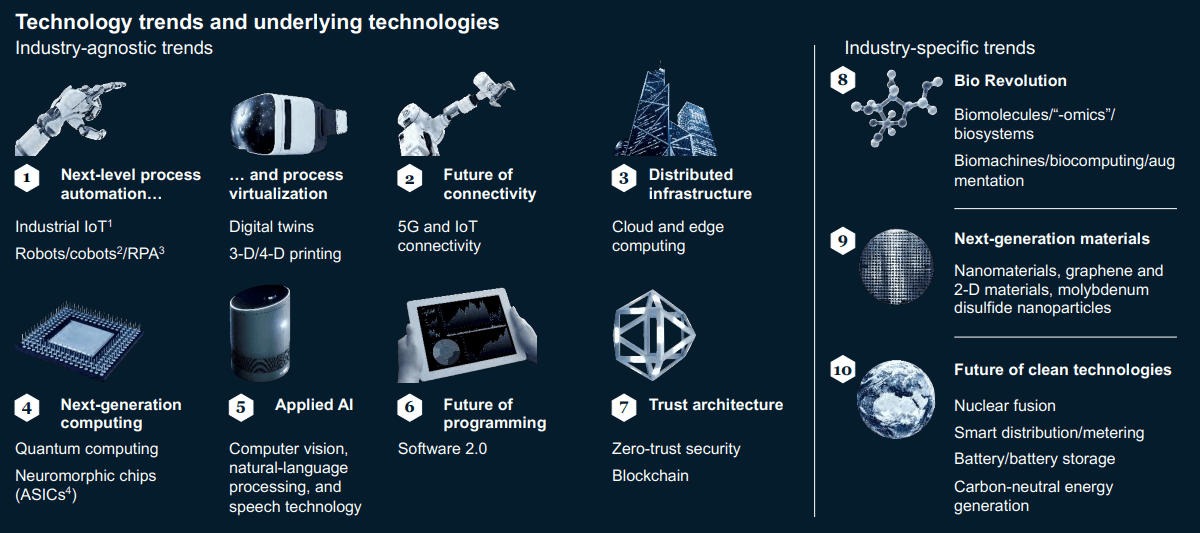This article discusses 10 innovative technologies that have the potential to change the world in the near future. Artificial Intelligence (AI), Blockchain Technology, Quantum Computing, Augmented Reality (AR) and Virtual Reality (VR), Internet of Things (IoT), 3D Printing, Biotechnology, Renewable Energy, Nanotechnology, and Autonomous Vehicles are the technologies that are transforming various industries, from healthcare to transportation, energy to manufacturing. These technologies offer a great opportunity to reduce greenhouse gas emissions, improve energy security, create job opportunities, transform healthcare, and much more. Though there are some challenges to overcome, the future with these technologies is exciting and full of possibilities.
10 Innovative Technologies That Will Change the Future
The world we live in today is constantly evolving thanks to technological advancements. From smartphones to automation, technology continues to make life more convenient and efficient. However, the pace of innovation is increasing rapidly, with new technologies being developed every day. In this article, we will discuss ten innovative technologies that will change the future.
1. Artificial Intelligence (AI)
Artificial Intelligence (AI) is a technology that enables machines to learn from experience and perform tasks that traditionally require human intelligence, such as recognizing speech, making decisions based on data, and interacting with the environment. AI is already revolutionizing many industries, and it has the potential to transform others, such as healthcare, transportation, and finance.
2. Blockchain Technology
Blockchain technology was initially developed to support the bitcoin cryptocurrency, but it has now evolved into a platform for secure and transparent transactions. The potential applications of blockchain are limitless, from supply chain management to voting systems to verification of identity.
3. Quantum Computing
Quantum computing is a technology that uses the principles of quantum mechanics to perform calculations that are impossible for classical computers. Quantum computers promise to solve complex problems faster than current computers, such as simulating chemical reactions or solving optimization problems.
4. Augmented Reality (AR) and Virtual Reality (VR)
Augmented reality and virtual reality technologies allow users to immerse themselves in virtual environments or overlay digital information onto the real world. These technologies have enormous potential for applications in gaming, education, and training.
5. Internet of Things (IoT)
The Internet of Things (IoT) refers to the network of devices, vehicles, and other objects that are connected to the internet, enabling them to exchange data and operate more intelligently. IoT has a broad range of applications, from smart homes and wearable technology to industrial automation and logistics.
6. 3D Printing
3D printing is a technology that creates three-dimensional objects by adding material layer by layer. 3D printing has the potential to revolutionize industries such as manufacturing, healthcare, and construction, enabling faster and more efficient production of customized products.
7. Biotechnology
Biotechnology is a technology that harnesses living organisms for useful purposes, such as genetic engineering, medicine development, and environmental remediation. Biotechnology has the potential to transform healthcare, agriculture, energy, and other industries.
8. Renewable Energy
Renewable energy technologies, such as solar and wind power, are becoming increasingly competitive with traditional fossil fuels. The shift towards renewable energy has the potential to reduce greenhouse gas emissions, improve energy security, and create new job opportunities.
9. Nanotechnology
Nanotechnology is a technology that involves the manipulation of matter on a nanoscale (about 1 to 100 nanometers). Nanotechnology has the potential to transform many industries, such as electronics, materials science, and medicine, by enabling the creation of new materials with unique properties or the development of new medical treatments.
10. Autonomous Vehicles
Autonomous vehicles, such as self-driving cars, are the future of transportation. These vehicles have the potential to reduce traffic congestion, improve safety, and provide greater mobility for people who cannot drive, such as the elderly or disabled.
In conclusion, these ten innovative technologies have the potential to transform the future and create new opportunities for people around the world. While there are many challenges to overcome in developing and implementing these technologies, the benefits they can bring are enormous.
